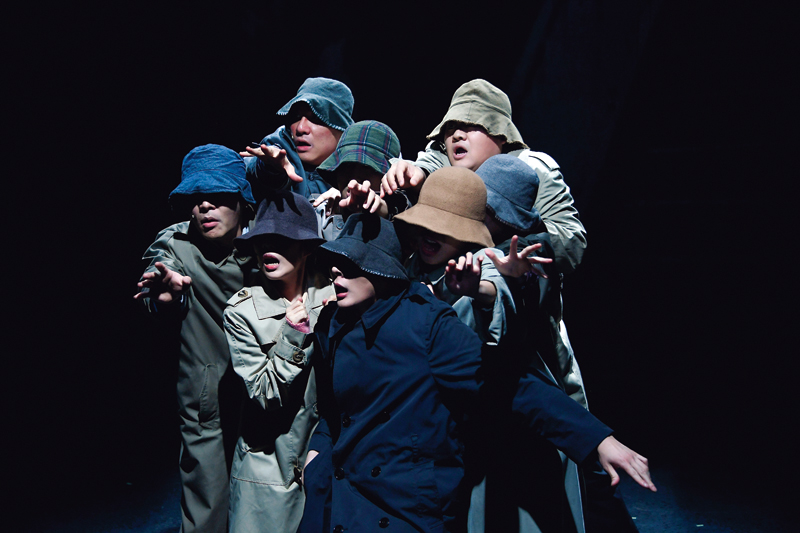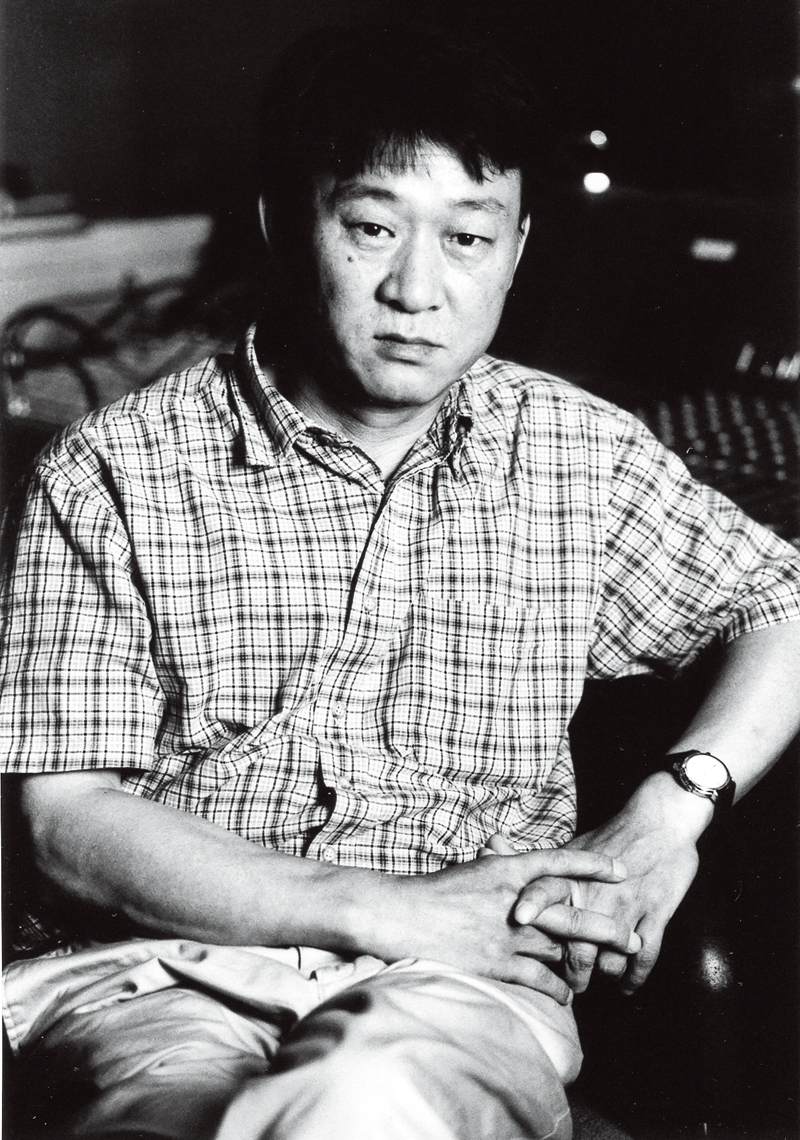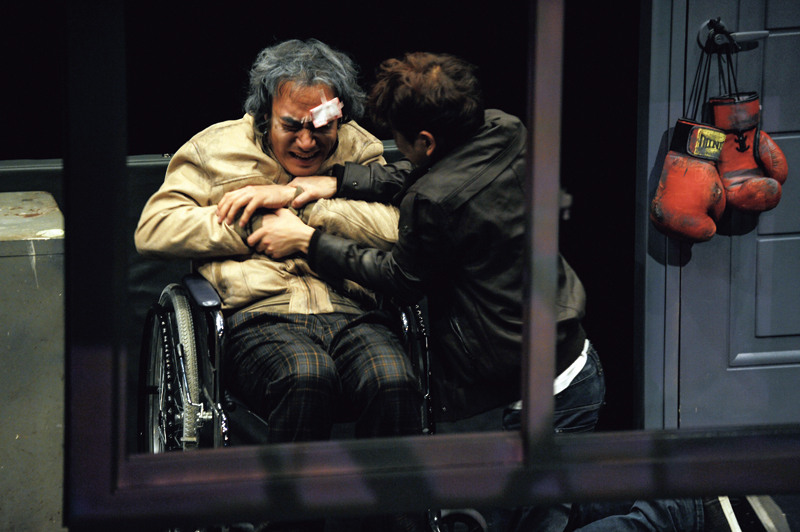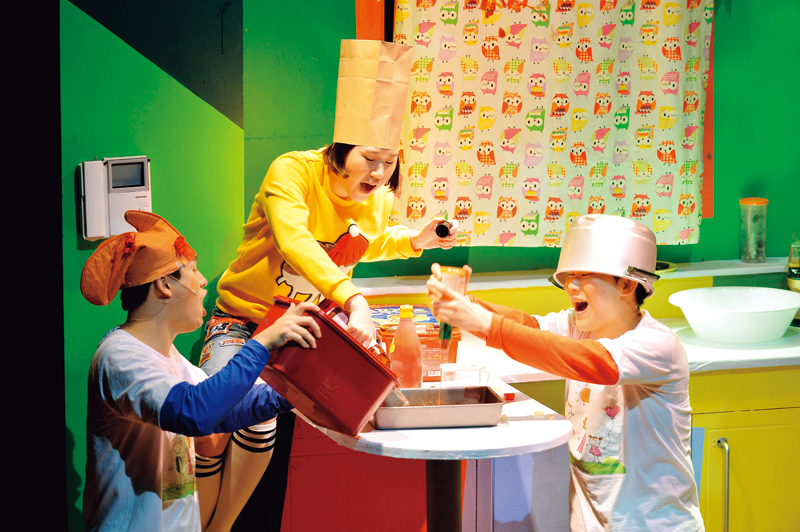Kim Min-ki passed away this summer, but he endures as a legend of the Korean music and theater worlds. He led the nation’s first generation of singer-songwriters and inspired pro-democracy demonstrators with his lyrics. Later, he became a playwright and theater owner, launching the careers of many actors and musicians.

A scene from a performance of the rock musical Subway Line 1. Kim Min-ki adapted the show in 1994 from the German musical of the same title, which premiered at the GRIPS Theater in Berlin in 1986. The music was arranged by Jung Jae-il, who composed the score of the award-winning movie Parasite and the Netflix smash hit Squid Game. Subway Line 1 ushered in the heyday of small theater productions in the 1990s.
ⓒ HAKCHON
The unforgettable voice and resonating, poetic lyrics of Kim Min-ki, dubbed “Korea’s Bob Dylan,” has captivated listeners for generations. Their indelible imprint drew warm tributes when he passed away on July 21, 2024, at the age of 73.
Kim debuted as a singer in the 1970s, when Korea was governed by a military dictator whose primary goal was economic development. Slogans like “Become a pillar of society” and “Study hard and contribute to the country’s development” were drilled into the minds of the younger generation for whom enjoying music was a luxury.
Breaking the shackles of the stringent era, Kim and other young musicians such as Hahn Dae Soo and Yang Byung Jip rose to prominence. Penning lyrics that were beautifully poetic yet also bitingly critical, both implicitly and explicitly, they vented their frustrations of living in an oppressive society. They were Korea’s first generation of modern folk singer-songwriters.
Kim was exceptional. He found a bottomless well of metaphors in plants and animals that we see every day but tend to overlook. They inspired his poems and songs, which he imbued with social messages. The lyrics and melodies of his songs may seem simple and unpretentious. Yet they have the power to profoundly move both the listener and the singer.

Kim Min-ki is lauded as one of Korea’s greatest singer-songwriters, and the iconic songs he wrote in the 1970s are still beloved today. After his career transition to theater production, he devoted himself to promoting small theater performances.
ⓒ HAKCHON
SYMBOL OF RESISTANCE
In 1987, the death by torture of Park Jong-chul, a university student and democracy movement activist, ignited a nationwide upheaval that became known as the June Democratic Struggle. The enraged public took to the streets singing “Morning Dew” (1971), one of Kim’s hit songs. This inflection point in modern Korean history led to direct presidential elections later that year, the first step toward true democracy. Today, the song is still identified with Korea’s pro-democracy movement.
Born in 1951, Kim was a promising art student during his school years. He entered the Department of Painting at Seoul National University in 1969, but fate intervened at a welcome party for first-year students, when he sang an impromptu duet with a friend. It created a sensation on campus and persuaded Kim to change direction. He put aside his paintbrushes, took up his guitar, and embarked on the path of a singer and composer.
Kim released his first and only studio album in 1971. Simply titled Kim Min-ki, it features ten songs, including “Morning Dew” and “Friend.” The album is considered a watershed in the Korean music industry that ushered in the era of modern singer-songwriters. But initially, the album was a victim of its own success. Kim’s songs were sung so frequently at pro-democracy protests that authorities decided to investigate him. Eventually, his album was pulled from record stores and most of his songs were banned.
Disheartened, Kim left school and the stage, and retreated to the countryside. He roamed from place to place, making a living working at farms, coal mines, and factories. It was during this time that he produced another iconic song, “Evergreen” (1979). Composed to celebrate the wedding of co-workers at a sewing factory, the song ends with the lyrics, “Although we face a long, arduous road ahead / we will persevere, undaunted, and ultimately prevail.” That last line moved pro-democracy demonstrators as well, and the song soon became an anthem among protesters.
Nearly two decades later, the song tugged at the nation’s heartstrings once again. In 1998, when many Koreans were experiencing economic hardships in the wake of the Asian Financial Crisis, an uplifting public service advertisement was aired. With “Evergreen” as the background music, it showed the professional golfer Se-ri Pak pulling off her shoes and socks and wading into the water to make a swing that brought her victory in the U.S. Women’s Open. The song’s time-transcending message and melody instilled hope and courage in Koreans, inspiring an indomitable spirit in those facing hardship.
BEHIND THE SCENES
Kim could have spent his life singing and writing songs, but instead, he decided to embark on a second chapter in his life — the theater. Not on the stage, but behind it. In 1978, he secretly gathered a group of workers and musicians without being detected by the authorities and produced the musical play Factory Lights (Gongjangui bulbit). A recording was distributed in the form of bootleg cassette tapes. The fast-paced drama told the story of workers who resist and unionize in the face of their employer’s oppression. The music, performed on both Western and traditional Korean instruments, tapped into an array of native and international genres, from folk, jazz, and rock ‘n’ roll to gugak, traditional Korean music. Considering the musical play’s structure, the recording could be considered a concept album that preceded Pink Floyd’s magnum opus The Wall.
In 1991, Kim made a complete transition to theater manager and director when he opened Hakchon, a small place in Daehangno, Seoul’s major theater district. It was the main venue for live performances before the rise of indie music in the live music clubs of Hongdae during the 1990s. Kim Kwang-seok, another legendary folk singer-songwriter, achieved the amazing feat of giving around one thousand performances at the theater before his untimely death in 1996 at the age of 31. Noh Young-sim’s Small Concert (1991) also contributed greatly to Hakchon’s growth. Featuring candid conversations with guests in an unscripted format with live music, the show was immensely popular. Eventually, KBS picked it up and turned it into a regular TV program, which later spawned other music talk shows such as Lee Sora’s Proposal, Yoon Do-hyun’s Love Letter, and Yoo Hee-yeol’s Sketchbook.
Kim went on to produce the hit rock musical Subway Line 1, an adaptation of Linie 1, written by German playwright Volker Ludwig for the GRIPS Theater in Berlin. The show is a satirical and humorous take on Korean society at the end of the 20th century. Staged four thousand times between 1994 and 2008, it is a monumental work in the history of Korean musical theater. It is also well known for having launched the careers of many famous film actors, including Kim Yoon-seok, Sul Kyung-gu, Cho Seung-woo, and Hwang Jung-min.

A scene from The Boxer, which premiered in 2012. The play is about connection and hope, the story unfolding through the unlikely relationship between an old, retired world boxing champion and a high-school boy branded as a problem case. Kim Min-ki adapted it from the German play Das Herz eines Boxers (A Boxer’s Heart) by Lutz Hübner, which won the Deutscher Jugendtheaterpreis (German Youth Theater Prize) in 1998.
ⓒ HAKCHON
UNASSUMING YET INSPIRING LEGACY
Born of Kim’s time working in rural communities, he developed a special fondness for children and took an interest in their lives. From 2004, he shifted his focus solely to children’s plays. Even while battling stomach cancer, he poured his heart and soul into the children’s musical Gochujang Tteokbokki, which would be Hakchon’s final production. Due to Kim’s deteriorating health and ongoing financial difficulties, the theater closed its doors in March 2024. Many were reluctant to let it go. Before its closure, actors, musicians and other artists gathered to mount the Hakchon Again project, a series of farewell performances. Four days before Kim passed, Hakchon was reincarnated as the ARKO Kkumbat Theater, operated by the Arts Council Korea (ARKO); it will continue to focus on children’s plays.

A scene from the children’s musical Gochujang Tteokbokki, a delightful growth story of two mischievous elementary school brothers. The critically acclaimed show, which premiered in 2008, has garnered numerous awards and is considered one of Korea’s foremost children’s musicals.
ⓒ HAKCHON
Due to the influence of Confucianism, Koreans tended to avoid calling people by their names in the past, instead using pseudonyms to address each other informally. Some sijo poets and traditional painters still prefer to use them, though the custom has largely disappeared. Kim had an unofficial pseudonym which he conceived himself: Dwitgeot. Interpreted as “a trivial being who remains in the back,” the name sums up Kim’s view of his own life. With a self-effacing attitude, he dedicated himself to supporting artists from behind the scenes and strove to make this world a better place.
Kim embraced history and boldly expressed his convictions through his songs and productions. Although he didn’t strive for fame, his achievements and impact made him a much beloved star anyway. In today’s Korean society, where many aspire to become celebrities and big stars, and even young children dream of becoming popular YouTube influencers or K-pop idols, his legacy looms larger than ever.